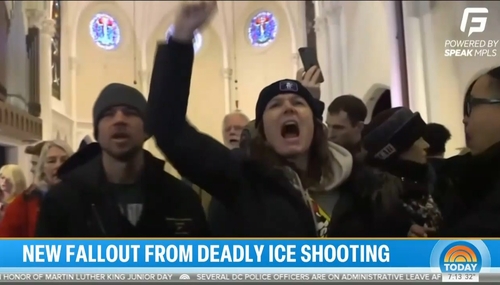 As you’ve probably already heard, journalists are insisting that tomorrow’s elections are a referendum on Iraq — so don’t even think about voting based on where the candidates stand on extending or rescinding the effective Bush tax cuts.
As you’ve probably already heard, journalists are insisting that tomorrow’s elections are a referendum on Iraq — so don’t even think about voting based on where the candidates stand on extending or rescinding the effective Bush tax cuts. On this morning’s Today, MSNBC’s Chris Matthews (a highly opinionated anti-war Democrat who will nonetheless anchor the network’s election night coverage) actually warned voters that if they don't vote Democratic, the President will regard it as a mandate to continue fouling up in Iraq.
“If you go in the voting booth and you say ‘yes’ to the Republican Party, the whole world press, everywhere in the world, they’re gonna report Wednesday morning, ‘Bush does okay in the election.’ If the people vote ‘no,’ the world press will say, ‘Bush’s Iraq policies were rejected.’ And by the way, the President will read it that way. If you vote Republican Tuesday, the President will say, ‘Thank you for supporting my war policy.’ It’s about Iraq, Iraq, Iraq and there’s no real other big issue,” Matthews told co-host Meredith Vieira.
So if it’s truly “Iraq, Iraq, Iraq,” how come there is so little media interest in actually reporting from Iraq itself? A new report on CNSNews.com finds “fewer than two dozen” journalists are working in Iraq now, down from more than 600 when the war began in 2003.
CNSNews reporter Randy Hall interviewed the president of Military Reporters and Editors (MRE), Sig Christenson, who said the paucity of reporters “clearly hurts everyone....We get less news out of Iraq, and more of it focuses on the bombing of the day — especially from the broadcast spectrum where mass media have such influence over American perceptions and opinion.”
An excerpt:
Although Iraq is one of the most important issues in Tuesday's midterm election, the number of journalists reporting alongside U.S.-led coalition troops in that country has fallen to "terrible" levels, according to the head of an organization of military journalists.Hall’s story goes on to list some of the factors that have kept reporters away from the war zone, mainly the expense and the risk. You can read the whole report at CNSNews.com.
More than 600 reporters, TV crews and photographers accompanied U.S. and British units during the coalition invasion of Iraq during March of 2003, but that number has dropped to fewer than two dozen in recent months, said Sig Christenson, president of Military Reporters and Editors (MRE).
That figure is also far less than October 2005, when 114 embedded reporters were in Iraq when the nation approved a new constitution, he noted.
By late September this year, the number of journalists fell to its lowest point of 11, and it has rebounded only slightly since.
Christenson, who also covers the military for the San Antonio Express-News, told Cybercast News Service that the coverage levels were "terrible."
"The number of embedded reporters in Iraq since the fall of Baghdad has tumbled precipitously, and the quantity and quality of the reporting from the war zone has gone down with it," Christenson said in a report on the MRE website.
"That clearly hurts everyone," Christenson noted. "We get less news out of Iraq, and more of it focuses on the bombing of the day — especially from the broadcast spectrum where mass media have such influence over American perceptions and opinion."




